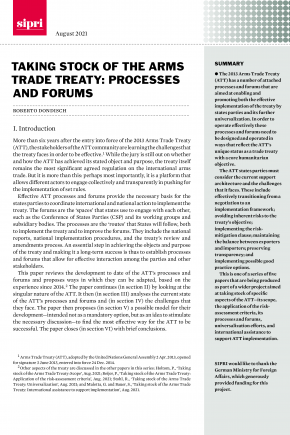Taking Stock of the Arms Trade Treaty: Processes and Forums
The 2013 Arms Trade Treaty (ATT) has a number of attached processes and forums that are aimed at enabling and promoting both the effective implementation of the treaty by states parties and its further universalization. In order to operate effectively these processes and forums need to be designed and operated in ways that reflect the ATT’s unique status as a trade treaty with a core humanitarian objective.
The ATT states parties must consider the current support architecture and the challenges that it faces. These include effectively transitioning from a negotiation to an implementation framework; avoiding inherent risks to the treaty’s objective; implementing the risk-mitigation clause; maintaining the balance between exporters and importers; preserving transparency; and implementing possible good practice options.
This is one of a series of five papers that are being produced as part of a wider project aimed at taking stock of specific aspects of the ATT—its scope, the application of the risk-assessment criteria, its processes and forums, universalization efforts, and international assistance to support ATT implementation.
I. Introduction
II. The singular nature of the ATT
III. The state of the ATT processes and forums
IV. Challenges for the ATT processes and forums
V. Options for adaptation of the ATT processes and forums
VI. Conclusions

